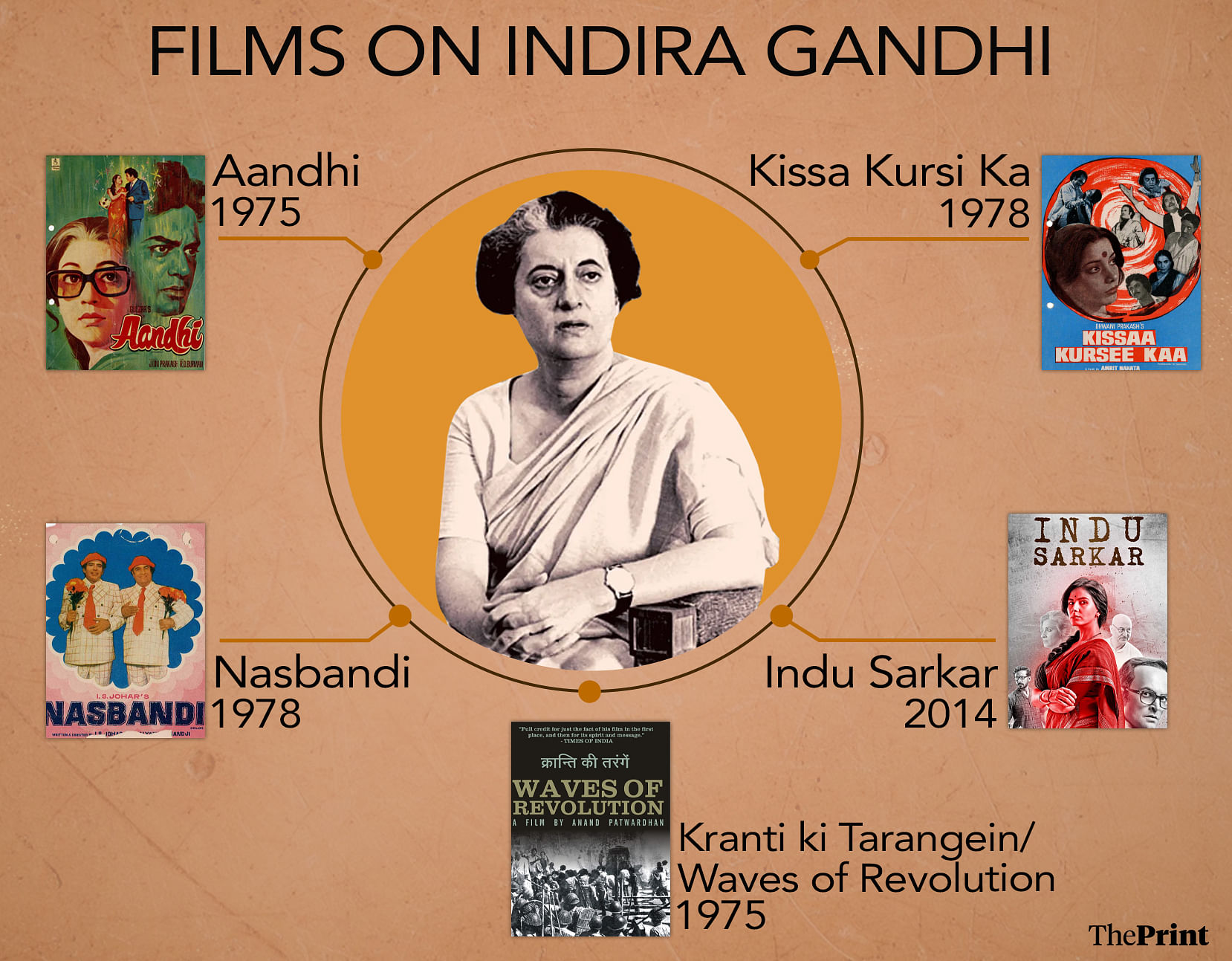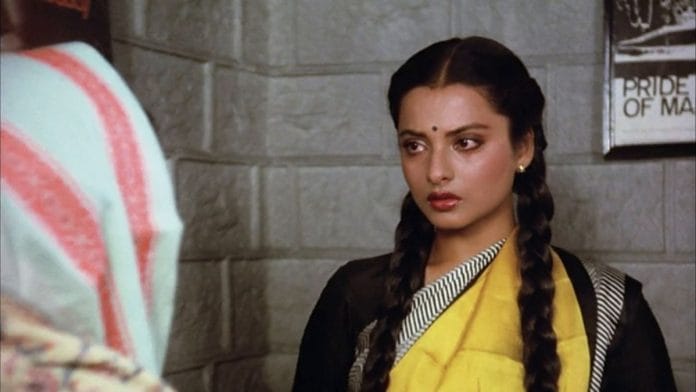In one of the early scenes in Hrishikesh Mukherjee’s Khubsoorat (1980), the wealthy widower Ram Dayal (David Abraham), reads a newspaper article aloud on how everyone has abandoned Indira Gandhi after the Emergency. His daughters, Manju (Rekha) and Anju (Aradhana) respond in mock rhyming sentences that the Congress is now broken.
The film may have been marketed as a family romantic comedy. But it is also a political commentary that was released three years after Emergency ended in 1977. Anju marries into a family where her mother-in-law Nirmala Gupta rules with an iron first. There are rigid schedules, dos and don’ts that everyone has to follow.
“Why have you not combed your hair? Why is it standing on end?” asks Nirmala in one scene. “Out of fear,” replies her son Jagan, played by Ranjit Chowdhry. This is a reference to how everyone is scared of Nirmala.
Jagan mouths some of the wittiest lines, including ‘Humare yahan auraton ki hi chalti hai’ (It is the women who rule in our house). Dwarka Prasad even calls Jagan ‘mother’s personal detective’ in a jab at those who kowtowed before Gandhi.
The household functions with clockwork precision. But a visit by Manju threatens Nirmala’s reign of terror. Played to perfection by Dina Pathak, Nirmala is a stern, no-nonsense lady who makes sure everyone follows ‘niyam-kanoon’ (laws and regulations). Through Nirmala and Manju, Mukherjee skillfully warns the viewer of the dangers of accepting the status quo, and of the importance of questioning authority.
There’s no laughter, and pranks in the household—the kind that Manju and Anju were accustomed to growing up. “These kinds of strict rules didn’t even exist in Emergency,” Manju says, before setting out to change that.
Khubsoorat has aged well, and is as relevant today as it was 24 years ago. Mukherjee infuses humour, mischief and spirit of rebellion into the plot, dialogue and acting to keep the viewer entertained at the same time. The screenplay was written by Gulzar, Shanu Banerjee and Ashok Rawat, based on a story by screenwriter D.N Mukherjee who also wrote Anand (1971).
Cinema’s rebellion
The Emergency years were marked by censorship. Filmmakers, singers, writers were silenced. Actors like Dev Anand, Manoj Kumar, Shatrughan Sinha, and Kishore Kumar in their ways refused to endorse Emergency, and paid penalties for it. Mukherjee’s film is a nod to that resistance.
Anti-establishment films were still being made in that era. In Gulzar’s Aandhi (1975), Aarti Devi (Suchitra Sen) is dressed like Indira Gandhi, and leaves behind her family to pursue political ambitions. Gulzar categorically denied the movie was based on Indira Gandhi, but the similarities were uncanny—from the white saree with blue border to her streak of grey hair.
A few months into its release, the film was banned on the alleged grounds of damaging the reputation of the Congress party. The film was rereleased and even streamed on Doordarshan after Gandhi was ousted from office. Gulzar then accepted that it was based on the former prime minister.
IS Johar’s Nasbandi (1978) about Sanjay Gandhi’s forced sterilisation initiative was banned, but later released on TV. Johar had roped in look-alikes of popular Bollywood actors such as Amitabh Bachchan, Manoj Kumar, Rajesh Khanna, and Shashi Kapoor for the movie.
Amrit Nahata’s Kissa Kursi Ka (1978) starring Shabana Azmi and Raj Babbar never saw the light of the day as Sanjay Gandhi and then-Information and Broadcast Minister, VC Shukla, allegedly destroyed prints of the movie. This was after the movie had to go through multiple cuts by the censor board.
This was also highlighted in another scene from Khubsoorat. One day, Manju performs a small play highlighting the tyranny of Nirmala who was expected to be not at home at the time. But she accidentally sees the play, and gets upset. Despite Manju later apologising, Nirmala banishes her from the house.
The song ‘Sare Niyam Tod Do’ also runs throughout the staging of the play. This is a direct reference to the fate of filmmakers and the films made during this time and hailing the spirit of rebellion.

Also read: ‘Aasha’ explored a different view of one-sided love—that of the woman
Mother-in-law’s tyranny
Khubsoorat was remade in Telugu as Swargam (1981), in Malayalam as Vannu Kandu Keezhadakki (1985) and in Tamil as Lakshmi Vandhachu (1986). The 2014 film Khoobsurat starring Sonam Kapoor and Fawad Khan was also loosely based on the original. Even Karan Johar’s Rocky Aur Rani Kii Prem Kahani (2023) drew from the film. Rani (Alia Bhatt) resists the tyranny of Dhanlakshmi (Jaya Bachchan) and her hold over everyone’s lives.
Rekha won the Filmfare Award for Best Actress for Khubsoorat, while the movie was declared Best Film. It established Rekha as a star who could carry a film on her own, even in the absence of big male stars, a feat she would recreate later with Khoon Bhari Maang (1988). She excels in mischievous moments, as the tender romantic ones with Inder, and manages to consistently hold one’s attention without being annoying or over-the-top.
In one of the scenes, the family friend who arranges the marriage of Chander and Anju tells Dwarka Prasad that it is Nirmala’s iron rule that is keeping the family together. This idea changes by the end of the film.
As the film reaches its ‘happy ending’, Nirmala realises that her family members can have fun and still be responsible. In the end, all is well, as she welcomes Manju into the now changed household, as her son Inder’s wife.
(Edited by Ratan Priya)






